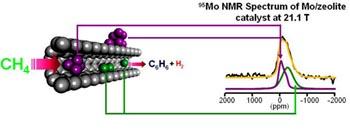
After the successful realization of selective oxidation of methane to methanol at a low temperature (800C) via the construction of a circulation system of multi-pair electrons, a research team headed by Prof. BAO Xinhe with the CAS Dalian Institute of Chemical Physics (DICP) has attained new progress in basic studies of methane direct activation.
In cooperation with the US National West Pacific Laboratory, they obtained information on the intact structures of active centers of solid catalysts. This accomplishment was achieved by applying a technique called the high field solid nuclear magnetic resonance for the investigation of practical catalyst systems. Their results were published in a recent issue of J. Am. Chem. Soc.. An abstract of the paper also appeared in the recently published Chemical & Engineering News (C&E News).
In this work, the molybdenum (Mo) species on the surface of the catalyst were observed directly with the 95Mo NMR technique. The DICP researchers found that during the preparation processes of the Mo/ZSM-5 catalysts, strong interaction would occur between the Mo species and the acidic sites of the ZSM-5 support, forming a kind of Mo-O-Al moiety. Moreover, this strongly interacting moiety was in equilibrium with the molybdenum oxide crystallites which were existing under a weak interaction state. It was revealed that the surface Mo-O-Al species were predominant if the Mo loading on the catalyst was high, while the molybdenum oxide crystallites were prevailing when the Mo concentration was low. By correlating with catalytic reaction results, it was concluded that those Mo-O-Al species located on the exchangeable sites were the active centers for reactions of methane direct conversions.
This was the first successful attempt in utilizing the High Field 95Mo NMR technique for the investigation of practical catalysts, manifesting the great potentiality of utilizing the High Field NMR technique in solving chemical problems concerning atomic nuclei like molybdenum, silver and titanium, which are difficult to tackle by traditional means.
Related News
Photos
More>>trade
market
- CAS to further cooperation with German academia in ocean studies
- Construction of largest aperture radio telescope starts in southwest China
- Premier urges scientists to help fight financial crisis
- CAS researchers receive TAN Jiazhen Awards for Life Sciences
- China's Think Tank Forecasts 8.3% GDP Growth in 2009





